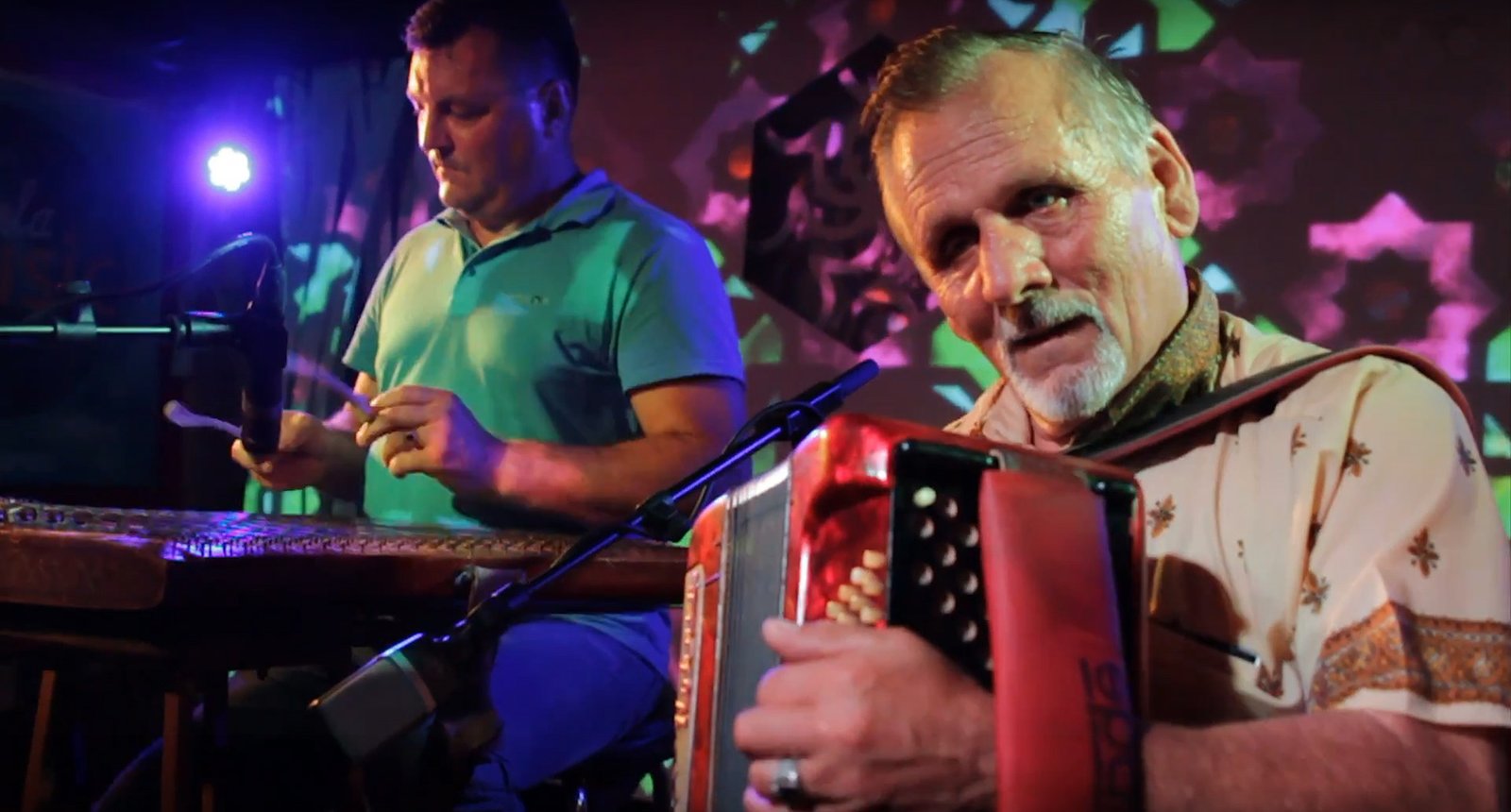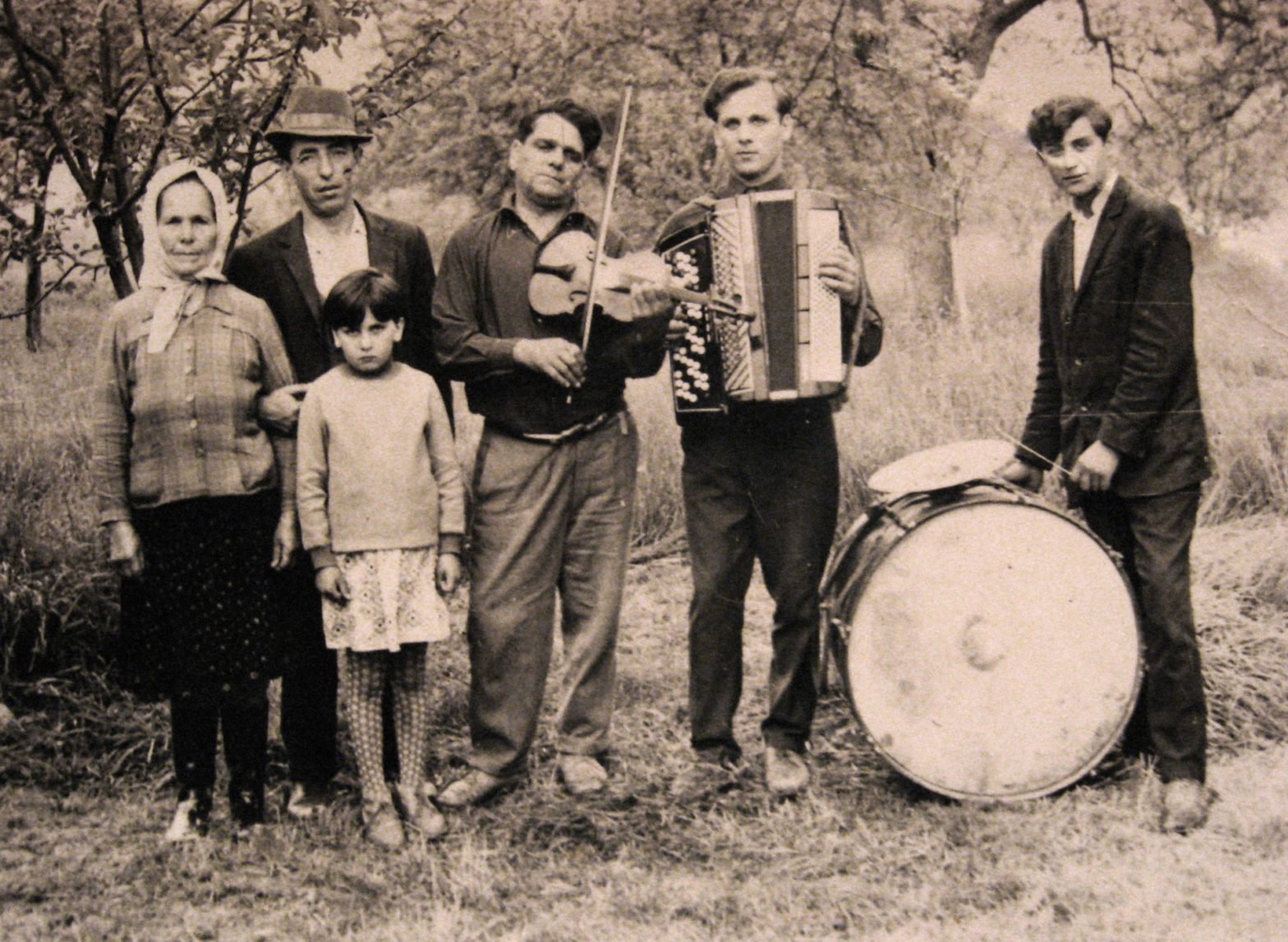It’s a snowy Wednesday morning in January 2019. I’ve come to the small town of Tiachiv, Ukraine to attend the funeral of Yosyp Cherniavets, an accordionist and bandleader who, like his father before him, was known locally as “Manyo” – the beckoner. For over thirty years, Yosyp led the Manyo Family Band (Родина Маньо), better known abroad as the “Técsői Banda” (band from Tiachiv), whose intoxicating mix of raucous multi-ethnic dance tunes and haunting ballads brought audiences to their feet from the basement beer halls of Budapest to New York’s Central Park. The band’s style and instrumentation were typical of the mountainous upper Tisza region — husli (violin), bayan (button accordion), bubyn (drum) and tsymbaly (hammer dulcimer) — but its rich, diverse repertoire set it apart from other local groups. Manyo played not only the traditional Rusyn (Ruthenian) wedding tunes typical of the region, but also Hutsul, Hungarian, Romanian, Jewish, Romani, Slovak, and Russian tunes. The band was a unique musical time capsule, a link to Transcarpathia’s ethnically diverse pre-war past.

Over one hundred people braved the frigid temperatures to pay their respects to Yosyp; I’ve never seen so many cars lining his street. Near the back of the weeping huddled crowd stands a group of musicians, among them fiddler Ivan Popovych and tsymbalist Vasyl Hudak, longtime members of Yosyp’s band. “End of an era”, I say, to which Vasyl replies, “It’ll be difficult without him, but we’ll do what we can to keep the music alive”. Yosyp’s passing came just 7 months after the death of his cousin Yuriy, the band’s longtime drummer and singer, bringing to an end a Ruthenian-Romani musical dynasty that spanned more than four generations.
Although he left behind four children and nine grandchildren, Yosyp never managed to interest any of them in the family’s musical trade. His greatest hope for a successor, his eldest son Artur, died tragically as a youth in the 1990s. Meanwhile, Yuriy and his wife Cilia were unable to have children. Thus, the Manyo musical legacy rests in the hands of the many musicians who collaborated with the Cherniavets family over the years. Fortunately, the most unique parts of their vast repertoire have been well-documented on their five albums: “Ruszin Népzene” (Rusyn Folk) and “Vertek engem, vertek” (I Was Beaten) produced by Ferenc Kiss for the Hungarian folk label Etnofon Records, and three discs produced by tsymbalist Vasyl Hudak on the Ukrainian Med Records label: “Мелодії Закарпаття” (Melodies of Transcarpathia), “Русинські коломийки 1 (Ruthenian Kolomiyky 1), and “Русинські коломийки 2” (Ruthenian Kolomiyky 2). Their music and lives were also captured in two documentary films, “Az utolsó kolomejka” (The Last Kolomeyka, 2008, dir. Júlia Sívó and András z. Surányi) and “Zakarpattia” (2018, dir. Shaun Williams).
Beginning with their first concerts in Hungary in the late-1990s at the invitation of folklorist Ferenc Kiss, the Cherniavets family gained worldwide renown, in particular within the Klezmer music scene. American musician and writer Bob Cohen included several tunes from the Manyo repertoire on his band Di Naye Kapelye’s 2009 album “Traktorist” and even brought the band to New York for a concert in 2010. I first met Yosyp and Yuriy in 2009 when I arrived in Transcarpathia as a volunteer English teacher with the US Peace Corps. My fascination with their music eventually led me to study ethnomusicology and base my MA thesis and a documentary film on their lives and work.

Yosyp Cherniavets was born in 1945 in the village of Vyshkovo (Visk) Ukraine, a majority-Hungarian enclave on Ukraine’s southwestern border with Romania. His father Yuriy “Manyo” Cherniavets, a legendary local fiddler, came from a family of Romani musicians from the village of Teceu mic near Sighetu-Marmației, Romania, and had moved north of the Tisza river in the 1920s to settle in what was then Czechoslovakia. Yosyp’s mother was a Hungarian from Vyshkovo. With her husband largely absent, she was left to raise Yosyp and his brother Misha on her own. The boys grew up in Vyshkovo speaking Hungarian and Rusyn (a dialect of Ukrainian) alongside their cousins, many of whom were also musical. Misha was playing the tsymbaly from an early age, and Yosyp got his first bayan in his teenage years. By the 1960s they were already playing at weddings and parties with their father. Their younger second-cousin Yuriy “Chupliuk” Cherniavets later joined the band as a drummer and singer.
Yuriy Manyo played weddings for all of Tiachiv’s ethnic groups, which in those days included a much higher proportion of Jews, Hungarians and Romanians than are present there today.
After his father’s death in 1982, Yosyp took over the band. They continued to play for weddings with a rotating cast of local fiddlers, including Ivan Popovych, Petro Babych, and Ion Șiman. Since Misha’s passing in 2007, the band has played with various tsymbalists, most often Vasyl Hudak from the village of Teresva, now director of the Tiachiv Regional House of Culture. In recent years, Yosyp remained active as the leader of the Manyo family band, performing at weddings and concerts throughout Transcarpathia and embarking on yearly tours to Hungary organized by their manager and dear friend, Imre Keszthelyi. They have also performed in Slovakia, the United States, and most recently, Bucharest, Romania, where Yosyp played what would be his final tour in November 2018.
Yosyp had an insatiable curiosity for music of all kinds, and was as eager to share as he was to listen to something new. He had a certain magnetism, a contagious smile and a sparkle in his eye as he played. Despite his many losses and financial hardships, he remained optimistic about the future of his music and his native land, Ukraine. Yosyp was up late singing carols and playing his accordion the night before he passed away. He suffered a fatal heart attack the morning of January 7th, 2019, Orthodox Christmas Day.
Yuriy Cherniavets was born in Tiachiv in 1951, the only child of Rusyn-Romani parents. His father, Oleksandr, was a cousin of Manyo and had been a “frontovik” in the Soviet army. Yuriy was proud to declare that, despite what anyone may say about him being a Gypsy, his parents were both documented as “Ukrainian” on their passports. Yuriy was a master of rhythm, whether dancing, stomping, or playing the drum; he knew the tunes so well that his drumming was not simply supporting the melody, it was intertwined with the melody, an integral part of it. He was also an accomplished singer, specializing in haunting wanderer’s songs (вандрувницька / vándor dalok), rowdy lad’s songs (легіньська / legényes) and king of the (often X-rated) kolomeyka.
In addition, he was also perhaps the world’s greatest player of the plyonka (or “film”). He would hide the thin piece of X-ray film in his cheek while singing, then suddenly flip it around to the front of his mouth and honk out a high-pitched version of the melody to the bewilderment of the audience. In fact, his instrument was a more versatile, hands-free replacement for the leaf or fish scale once played by Transylvanian shepherds.
If Yosyp was the leader and historian of the group, then Yura was the performer and comedian; always the life of the party, he could make any household object into a percussion instrument and was never lacking in dirty jokes. Even after he was diagnosed with terminal throat cancer in late 2017, he didn’t lose his sense of sense of humor, and expressed confidence that better days were ahead.
Farewell, my friends — the Manyo Family Band is together again at last.
Note: a Hungarian-language translation of this article appeared in the 2019/01 issue of folkMAGazin.

hi,
excellent site very well documented and respectuous of the people from that region; keep up the good work Shaun !